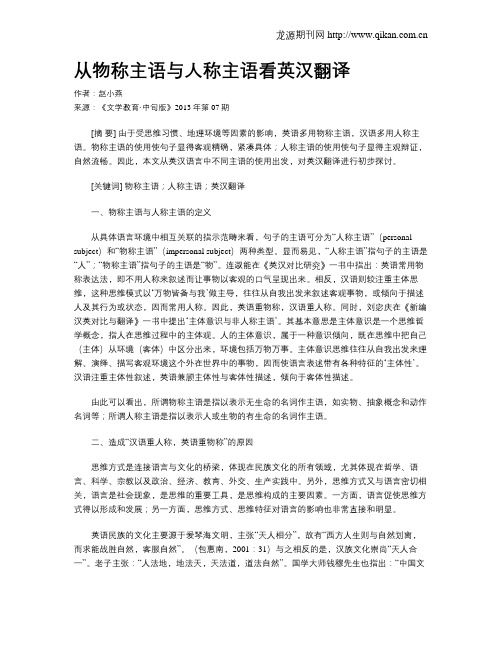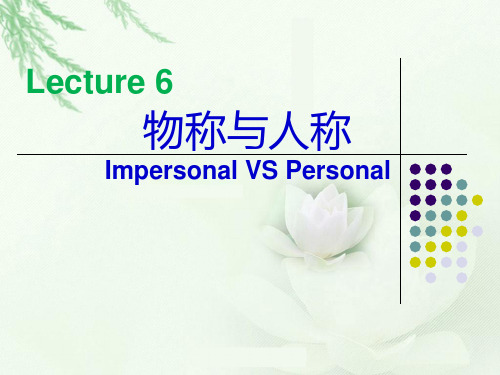论人称与物称的汉英转换--以商务英语翻译为例
物称和人称

2 用作虚义词,代替的主语是难以言 表的现象或情形,用以表示自然现象 、时间、空间以及惯用语之中。 How is it with the sick man?
3 用作强调词,应到所需要的成分, 也是一种形式主语。 It is a good horse that never stumbles.
2. 转化非人称主语,把英语的简单句和复 杂句拆成汉语的并列句或流水句。
1) Her weariness and the increasing heat determined him to sit down in the first convening shade.他疲惫不堪,天气也越来越热,他决意一遇到个近 便的阴凉处,就坐下来休息。
信息中心位置,从而突显物称倾向。
汉语在无确定人称时,采用如有人,人们, 别人,大家等泛称或无主句,从而突显人称
倾向。
1)用作先行词代替真正的主语或宾语。 It never occurred to me that she was so dishonest. 我从来没想过她会这么不老实。
2)用作虚意词,代替的主语是难以言明的现象或者情形,如用以 表示自然现象、时间、空间以及惯用语中。 How is it with the sick man ? 那个病人怎么样了?
3. 把非人称代词主语句换成汉语的的无主句或主 语泛称句。
1) The mastery of a language requires painstaking efforts. 要掌握一门语言,必须下功夫。
2) A little flattery will fetch him. 稍一奉承就会把她迷惑住了。
4) A lack of information and formal educational training had left many persons without any generalized standards of judgment applicable to this novel situation.
物称与人称 英语翻译

• Westerners look at the world in a objective and rational perspective. Emphasis is placed on the influence the outside world has on man. That’s why impersonal subject is frequently used in English. e.g.
• 你怎么了? • What has happened to you?
• As Chinese advocate the unity of man and nature and look at the world in a personal and subjective perspective, importance is attached to the influence that man exerts on things and himself. So personal subject is largely preferred in Chinese. e.g. 他们欣喜若狂。 A great elation overcame them. 不同的人对食物持不同态度。 Attitudes toward food vary from person to person.
• e. “把”…; “让”… structures • His illness left him sensitive. 疾病让他变得很敏感。 • The book defies easy classification. 很难把这本书归入哪个类型中。 • The noise frightened all of us. 那个声音把我们大家吓坏了。
物称与人称

B.用非人称代词it 作主语,代词it 除了用 来代替除人以外的生物或事物之外,还 广泛用于作填补词。 ① 用作先行词,代替真正的主语或宾语: It never occurred to me that she was so dishonest. 我从来也没想到她这么不老实。 ② 用作虚义词,代替的主语是难以言明 的现象或情形,如用以表示自然现象、 时间、空间以及用于惯用语之中: It’s only half an hour’s walk to the ferry.
在英汉转换中,用“物称”代替“人称”常常是 一种有效的手段,如: 一看到那棵大树,我便想起了童年的情景。 The sight of the big tree always reminds me of my childhood. 近来忙于其他事务,未能早些复信,深感抱歉。 I am very sorry that the pressure of other occupations has prevented me from sending an earlier reply to your letter.
• 汉语没有像英语那样的多重被动式,没有 用“it”作主语的非人称被动式,也少用一 般被动式,而较多用主动形式表达被动意 义。汉语若要表达类似英语那种被动的客 观口气,则常常采用无主句、主语省略句、 祈使句或无形式标志的被动句。
① Wrongs must be righted when they are discovered. 发现了错误,一定要改正。 ② Specialties in colleges and universities should be adjusted and teaching methods improved. 必须调整高等院校的专业设置,改进教学方法。
汉英主语的差异在汉英互译中的转换

第34卷第5期2021年9月濮阳职业技术学院学报Journal of Puyang Vocational and Technical CollegeVol.34No.5Sep.2021汉英主语的差异在汉英互译中的转换郑帅(濮阳职业技术学院外语与旅游学院,河南濮阳457000)摘要:由于汉英思维的差异,语言表达的角度不同,在主语的选择上,汉语侧重"人称主语”,英语■青睐“物称主语”。
在汉英翻译中,需要对主语进行适当转换,使译丈忠实通顺地再现原丈的内容和风格。
关键词:汉英翻译;人称主语;物称主语中图分类号:H315.9文献标识码:A每种语言都是独特的,在词汇、句法、篇章层面各具特色。
语言像一面镜子,映射了其深厚的民族文化和鲜明的思维方式。
翻译是一座桥梁,连接着源语和目的语,是语言和文化的融汇和贯通。
翻译过程中要充分考虑两种语言的结构特点、文化特色、表达习惯和译入语读者的接受程度。
由于英汉文化背景和语言发展的轨迹不同,汉语与英语存在较大差异,其中,在主语的选择上,英语多用物称做主语,即用无生命的抽象的事物做主语,呈现、突出事物的客观性,减少主观臆断的色彩,结构严谨;而常用描写人的动词做谓语,无灵主语和有灵动词巧妙结合,迸发出奇妙的反应,句子可爱俏皮,语气委婉。
汉语倾向人称表达法,用有生命的人或物做主语,从自我的角度出发,理解、叙述、描写客观环境或外在事物,使句子表达更具主观意味。
一、汉、英主语差异的文化根源语言是文化的载体,体现了一个民族的历史文化、社会规范和行为准则;语言是思维的外壳,词汇和句法体现了人类思维的过程和结果。
对比研究英语和汉语,实质上是探讨中西民族的文化差异,尤其是思维方式的差异。
中西方的主体意识和客体意识对立,是造成英汉语言主语选择差异的深层次原因。
在人与自然的关系上,西方主张“天人相分”,认为世间万物是对立的,如人与自然、思维与存在、物质与精神;人类拥有支配自然和改造自然的能力,文章编号:1672-9161(2021)05-0084-03能够依靠自身的智慧和科学的力量征服和主宰世界⑴35"。
从物称与人称角度探讨英汉翻译策略

On E-C Translation Strategies from theDistinctions in Impersonal and Personal SubjectsAbstract: Whether a translator is aware of the fact that emphasis on impersonal and personal subjects in English and Chinese characterizes the two languages basically decides the quality of translation. Hence, a scientific analysis of the distinctions between impersonal and personal subjects is crucial. This paper mainly deals with the historical reasons for the distinctions, the comparison of impersonal and personal subjects, and English to Chinese translation strategies, for the sake of a better inspection of the different modes of thinking and recognition, and a better guidance to practical translation.Key words:impersonal; personal; subject; translationContentsAbstract (English) (I)1 Introduction (1)2 Literature Review (1)3 Historical Reasons for Emphasis on Impersonal Subject in English and on Personal Subject in Chinese (2)4 Comparison of Distinctions Between Impersonal and Personal Subjects (5)5 Translation Strategies for Translating English into Chinese (7)5.1 Five Major Categories of Impersonal Subjects (7)5.1.1 Sentences with Abstract or Inanimate Subjects (7)5.1.2 Sentences with Impersonal Pronoun It (8)5.1.3 Sentences with Passive V oice (9)5.1.4 Sentences with There Be (9)5.1.5 Sentences with Possessive Case (9)5.2 E-C Translation Strategies (10)5.2.1 Changing Object into Subject (10)5.2.1.1 Subject + Predicate + Object + Object Complement (10)5.2.1.2 Subject + Predicate + Preposition + Prepositional Object (11)5.2.1.3 Subject + Predicate + Object (12)5.2.1.4 Subject + Link Verb + Predicative + Prepositional Object (12)5.2.2 Translating Sentences with Pronoun It Acting as Subject (12)5.2.2.1 Preparatory It (12)5.2.2.2 Unspecified It (13)5.2.2.3 Emphatic It (13)5.2.3 Translating Sentences with Passive V oice (13)5.2.4 Translating Sentence Structure There Be (14)5.2.5 Possessive Case + Noun/Gerund (14)6 Conclusion (15)References (15)Abstract (Chinese) (17)1 IntroductionTranslation is a major vehicle for cross-cultural communication. Speaking of translation, impersonal and personal subjects are not supposed to be overlooked. Impersonal subject is frequently used in English, which presents objects or ideas objectively. On the contrary, Chinese tend to describe human beings and their actions or statements from their own perspectives when they want to show something, which is called personal expression. A better understanding of impersonal and personal subjects is of considerable significance in translation and transcultural communication.It is no coincidence that impersonal subject is used in English and that personal subject is used in Chinese. Language, especially the features of linguistic construction, is influenced and determined by mode of thinking.Still, mode of thinking bridges culture and language. On one hand, mode of thinking is closely related to culture, which is epitome of cultural and psychological features and restricts the generation of culture and psychology in turn. Different modes of thinking primarily cause different cultures. On the other hand, mode of thinking is intimately linked with language, which is the inmost mechanism of linguistic generation and development and accelerates the formation and development of thinking mode.Therefore, it is accepted that, for the purpose of studying a language, studying the implicit culture that distinguishes the language comes first. To be precise, it equals to studying the thinking mode, which influences and restricts the formation, development and structural style of a given language, and implicit culture such as values, enjoys priority.2 Literature ReviewIn the West, a great many scholars and professors have studied and are studying the relationship between thinking mode and linguistic construction. Wilhelm von Humboldt is one of them. He put forward that language is a kind of world view. Language is created from mankind’s experiences. And they confined themselves in their own language with the experiences. A linguistic fence is erected all around the nation. Only when the natives of the nation surmount the crib can they divorce themselves from the restriction of the barrier [1]. Sapir and Whorf carried on and developed Humboldt’s theo ry, and then brought forward the well-known Sapir-Whorf Hypothesis. Basically, they suggested that language is not just an expression and indication of thought, but also a mode which forms thought [2].Wilhelm Wundt, a German psychologist, believed that the mental features of a certain nation can be a revelation of its vocabulary and grammar. In other words, thinking influences and determines the application of a language to a large extent, and different modes of thinking lead to the differences in linguistic construction [3], the same with Nida’s view that “Each language has its own genius”[4].Domestically, Sun Xianan (2000) pointed out that a distinct ethnic brand is ironed on a nation’s history and habitats, with social evolution, geographical environme nt, natural conditions, economic life, and mental mechanism included, and that the brand, deeply engraved in language systems, turned into a typical characteristic of the national language [5]. Qian Mu, a master on studies of ancient Chinese culture, considered that Chinese culture centers on humanity and on life, which is teemed with cultural awareness and humanistic spirit. Chinese culture, by its nature, is subordinate to humanistic culture [6]. Wang Li stressed that subject is required in each sentence in grammars of Western languages. And it is an exception without a subject, which is called ellipsis. Conversely, it is a usual case that subject is omitted as long as the agent or doer is definitely obvious in Chinese grammar [7]. Without using personal subject, impersonal subject is often used in English to present something or an idea objectively, as Dr. Lian Shuneng stressed [8].3 Historical Reasons for Emphasis on Impersonal Subject in English and on Personal Subject in ChineseThe thinking mode of a certain nation gradually formed under the constant influence of geography, philosophical background and cultural traditions. The natural geographical conditions of ancient Western countries and ancient China played an important role in the origin of the differences between Chinese and Western thinking modes.As a typical agricultural society, China witnesses its development in a closed continental environment surrounded by unattainable mountains in the west and by insurmountable ocean in the east, with Chinese culture emanating from the vast country areas of the Yellow River basin and rooting in the countryside. The Chinese people live in the fertile land in central Cathay in a self-contained way, enjoying the preference of nature. People there believe in the favorable opportunity, geographical location and social condition. It is the relaxed and harmonious atmosphere that shapes a significant concept in ancient Chinese philosophy, namely, oneness between man and nature. Viewing the worldfrom this perspective, Chinese people deem animism that nothing in the world is lifeless and inanimate and that all the combination of colors, lights and patterns is continuously circulating life form which communicates with human beings. Thus, objects are learned as a whole and the world is regarded as a virtually inseparable organism and everything and all phenomena are interpreted from this viewpoint that yin and yang are the two opposing principles in nature, for instance, heaven and earth, sun and moon in the cosmos, male and female in the world. The production, change and development of everything accord with the effect of yin and yang.Ideologically, the maintenance of national peace and the pursuit of harmonious community are cardinal points from Confucianism to Taoism. Meanwhile, the development of traditional culture that integrity is advocated while individualism is ignored, and that duties and responsibilities are thought to be essential while individual rights are considered to be trivial.Philosophically, oneness between man and nature is the fundamental spirit in traditional Chinese philosophy dominated by Confucianism and Daoism, the gist of which is that the entire universe, including heaven, earth and mankind, is integrated and cannot be divided [9].The five elements (mental, wood, water, fire, earth) of Chinese philosophy are distinct from the four elements (earth, water, fire, wind) in Greek and Indian cultures. The former one concentrates on its practical functions in daily life. That is why mental is included [10]. Thus, no matter it is Confucianism or Daoism, oneness between man and nature is the intellectual foundations of China. Yin and yang, the five elements and the Eight Diagrams, doctrine of mean, and oneness between man and nature all reflect the Chinese notion that mankind and nature are believed to be integrated and the interrelationship of human beings and the relationship of human and nature are seen as an organic integrity which is dynamically balanced. Moreover, an integrated world view implies an emphasis on instinctive recognition. In every respect, the thinking mode of Chinese is characterized by comprehensiveness, integrity, subjectivity, intuitiveness, dialectic, ambiguity, and it is spiritual, introverted, intuitive and subjective.Compared to the closed continental environment in China, Western culture can be classified as prosperousness-only and powerfulness-only extroverted business culture andmarine culture. The ancestors of British and American were Western nomads living in a roaring, turbulent, and harsh ocean-surrounded environment and tasting the vagaries of nature. The atmosphere endowed them with expansionary and adventurous characters, intense inclinations to conquer the nature, and strong desires to control and conquer others. Consequently, Western nations formed a distinctive thinking mode from China. In other words, the cosmos was divided into two different worlds where mankind and nature were divided and opposite, meanwhile, the same with material and spirit, society and nature, etc. Nature was placed entirely opposite to human beings, and was destined to be transformed. And people were born to learn about the nature, govern the nature and dominate the nature. Individual values represented the rational spirits during the process of exploring the truth. It is simple to come to the conclusion that Westerners focus on awareness, ration, evidence and logical analysis.Throughout the development of Western intellectual history, individualism never fails to attract Westerners. It is known that government came into being because of the agreement of free civilians. Once freedom is deprived, the right-deprived mass is entitled to revolute to recapture their freedom since sovereignty is in the hands of people.In the mainstream culture of Britain an America, analytic recognition shed light on how thinking mode affects the world, not on how to achieve a harmonious relationship between man and nature. The objective and meaning of life lie on learning about and governing the world. Mankind is the master of all things, capable of controlling and dominating the world. Nature is opposite to human beings and is supposed to be transformed and conquered. So it can be concluded that the thinking mode of British and Americans is characterized by individualism, objectivity, analysis, logic, conformation, accuracy, and it is material, extroverted, analytic, logical and objective.To sum up, it is the different thinking modes that cause the impersonal and personal subjects in English and Chinese. The British and American thinking mode is dividedness between man and nature. Instead, the Chinese thinking mode is oneness between man and nature. Different modes of thinking give rise to the fact that Christian culture prevailing in English-speaking countries emphasizes rational and logical analysis and individualism that individual value can be independent of community value, while Confucian culture, a major part of traditional Chinese culture, lays particular emphasis on integrity and intuition inthinking and cognition.4 Comparison of Distinctions Between Impersonal and Personal SubjectsIn English, impersonal subject is always used by native speakers who are inclined to narrate or describe something or an idea subjectively without using a personal subject. That is, the speaker and the listener, or the writer and the reader try to conceal themselves in order to make sure that they are irrelevant to the matter, although it may lead to an absence of people-to-people relationship.G. Leech and J. Svartvik (1974:25) pointed out that “Formal written language often goes with an impersonal style, i.e. one in which the speaker does not refer directly to himself or his readers, but avoids the pronouns I, you, we. Some of the common features of impersonal language are passives, sentences beginning with introductory it, and abstract nouns”[11]. To exemplify what is said above, a piece of library notice is given.It has been noted with concern that the stock of books in the library has been declining alarmingly. Students are asked to remind themselves of the rules for the borrowing and return of books, and to bear in mind the needs of other students. Penalties for overdue books will in the future be strictly enforced.近来已注意到本馆存书惊人地减少,此事令人关切。
从物称主语与人称主语看英汉翻译

从物称主语与人称主语看英汉翻译作者:赵小燕来源:《文学教育·中旬版》2013年第07期[摘要] 由于受思维习惯、地理环境等因素的影响,英语多用物称主语,汉语多用人称主语。
物称主语的使用使句子显得客观精确,紧凑具体;人称主语的使用使句子显得主观辩证,自然流畅。
因此,本文从英汉语言中不同主语的使用出发,对英汉翻译进行初步探讨。
[关键词] 物称主语;人称主语;英汉翻译一、物称主语与人称主语的定义从具体语言环境中相互关联的指示范畴来看,句子的主语可分为“人称主语”(personal subject)和“物称主语”(impersonal subject)两种类型。
显而易见,“人称主语”指句子的主语是“人”;“物称主语”指句子的主语是“物”。
连淑能在《英汉对比研究》一书中指出:英语常用物称表达法,即不用人称来叙述而让事物以客观的口气呈现出来。
相反,汉语则较注重主体思维,这种思维模式以‘万物皆备与我’做主导,往往从自我出发来叙述客观事物,或倾向于描述人及其行为或状态,因而常用人称。
因此,英语重物称,汉语重人称。
同时,刘宓庆在《新编汉英对比与翻译》一书中提出‘主体意识与非人称主语’。
其基本意思是主体意识是一个思维哲学概念,指人在思维过程中的主体观。
人的主体意识,属于一种意识倾向,既在思维中把自己(主体)从环境(客体)中区分出来,环境包括万物万事。
主体意识思维往往从自我出发来理解、演绎、描写客观环境这个外在世界中的事物,因而使语言表述带有各种特征的‘主体性’。
汉语注重主体性叙述,英语兼顾主体性与客体性描述,倾向于客体性描述。
由此可以看出,所谓物称主语是指以表示无生命的名词作主语,如实物、抽象概念和动作名词等;所谓人称主语是指以表示人或生物的有生命的名词作主语。
二、造成“汉语重人称,英语重物称”的原因思维方式是连接语言与文化的桥梁,体现在民族文化的所有领域,尤其体现在哲学、语言、科学、宗教以及政治、经济、教育、外交、生产实践中。
6.英汉对比之物称与人称汇总

3)具体事物作主语。 我们迎着朝阳来到甲板上。 The morning sun greeted us as we came out on the deck. 他收到一份紧急电报,匆匆去了洛杉矶。 An urgent telegraph hurried him to Los Angeles. 4)具有动词意味的名词作主语。 (人们)发现新物种后就可以研制新药。 The discovery of new species will lead to new drugs. 他想起这些,便会增加生活的热情。 The remembrance of these will add zest to his life.
2. 把汉语流水句转换成英语复合句。
我感到很饿,又发现日影移动,这是我明白:自从我 睡着以后,太阳已走了很长的路了。 My hunger and the shadows tell me that the sun has done much travel since I fell asleep. 谁想要理解拿破仑其人及其对近代欧洲所产生的影响, 谁就得稍微注意他的家族特征。 The Characteristics of his family claim some attention from all who would understand Napoleon and the influence which he was to wield ove把非人称主语转换成汉语的状语或介词短语:
A Contrastive Study of English and Chinese-8

汉译英:从人称到物称
至于选择何种方法,上文关于英译汉中已有所触 及:英语物称结构汉译当以意译或归化为主,直 译或异化为辅,其前提是不过分偏离汉语基本的 行文规则及表达习惯。 同样,在汉译英过程中,某些句子的转换也会有 两种可能的选择,只要译文符合译入语表述习惯, 或切合目的语行文规则,有灵主语句也好,无灵 主语句也罢,都不妨认为是有效选择。 有灵主语句与无灵主语句不过反映了同一种语义 不同的表述视角,其本身并无优劣之分,选择完 全在于译者根据语境或上下文需要进行灵活取舍 与
概述
然而在英语中,物称结构或无灵主语句实在属于 常规表达手段,而非修辞手法。从下例可以看出, 物称现象与拟人辞格还是不尽相同的。例如: Hunger came to his stomach; an icy hand reached down his throat and clutched his intestines and tied them into a cold, tight knot that ached. 他饥肠辘辘,喉咙里仿佛伸进来一只冰冷的手, 将肠子牢牢攥紧,拧成死结,又冷又紧,阵阵作 痛。
汉译英:从人称到物称
他说不出话来。 译文一:He failed to say anything. 译文二:Words failed him. 从这条山路往南走,就是公路。 译文一:Walking south along the mountain path, you will get to the highway. 译文二:This mountain path leads south to the highway. 世纪之交,中国外交空前活跃。 译文一:At the turn of the century, China is very active in its diplomatic activities. 译文二:The turn of the century finds China most active on the diplomatic arena.
- 1、下载文档前请自行甄别文档内容的完整性,平台不提供额外的编辑、内容补充、找答案等附加服务。
- 2、"仅部分预览"的文档,不可在线预览部分如存在完整性等问题,可反馈申请退款(可完整预览的文档不适用该条件!)。
- 3、如文档侵犯您的权益,请联系客服反馈,我们会尽快为您处理(人工客服工作时间:9:00-18:30)。
论人称与物称的汉英转换--以商务英语翻译为例李太志【摘要】Personal subject is an obvious feature in Chinese while impersonal subject is an outstanding characteristic in English .As a result , the personal subject in Chinese is often transferred into impersonal subject in English translation .Contrastive analysis of the differences be-tween Chinese and English in the use of personal and impersonal subject shows that this transfer is more common and necessary in formal -style BE translation .%汉语多用有生命的词语作句子的主语,并较多地使用拟人手法,行为主体或句子主语常常由人或以人为本的机构来担当。
这就是汉语突出人称的句法修辞倾向。
与汉语不同的英语句法修辞特点之一就是物称主语,也就是以抽象名词和物质名词作为主语的句法修辞特征。
在文体正式的商务英语中,这种句法修辞倾向就更明显。
对比分析汉英两种语言之间的这一差异,对于我们英译来说,有着重要的启示与警示。
【期刊名称】《广东石油化工学院学报》【年(卷),期】2014(000)002【总页数】3页(P41-43)【关键词】商务英语翻译;汉语人称;英语物称;汉英转换【作者】李太志【作者单位】广东石油化工学院外国语学院,广东茂名525000【正文语种】中文【中图分类】H315.9在《英语交际语法》(1974)一书中,利奇(G.Leech)和斯瓦特威克(J.Svartvik)指出:“Formal written language often goes with an impersonal style;i.e.one in which the speaker does not refer directly to himself or his readers,but avoids the pronouns I,you,we.Some of the common features of impersonal language are passives,sentences beginning with it,and abstract nouns.”[1]钱歌川在《英语疑难详解》(1978)中说:“我们说中文时,惯常都要用人或生物做主语,而英文则爱用无生物做主语。
”比如,英语习惯使用“It is my hope that...”这种非人称主语,而不常用“I hope that...”[2]。
物称较多地用于商务英语文体,其目的是为了使文字更加客观。
这就是汉语突出人称与英语倾向物称的句法修辞差异。
在商务汉英翻译转换过程中,对比分析汉英之间的人称与物称之间的差异可以给人以有益的启示和重要的警示。
1 商务汉英人称与物称之间的句法修辞差异对比分析汉语多用有生命的词语作句子的主语,并比较多地使用拟人化的说法,行为主体或句子主语常常由人或以人为本的机构来担当。
这就是汉语突出人称(Personal)的句法修辞倾向。
与汉语不同的英语句法修辞特点之一就是物称(Impersonal)主语,也就是以抽象名词和物质名词作为主语的句法修辞特征。
在文体正式的书面英语中,这种句法修辞倾向就更明显。
请对比分析以下下划线的商务汉英翻译实例:①我们可以肯定,如您能将我们的产品和其他供应者的类似品种进行公正的比较,您定会相信我们的价格是合理的,并乐于接受我方2008年3月15日函中的报价。
英译:It is our firm belief that a fair comparison of quality between ourproducts and similar articles from other sources will convince you of the reasonableness of our prices and as a result,you will be ready to accept what we quoted in our letter of March 15th,2008.[3]②你要想在中国生意成功,你就需要提供长期承诺保证,并具有全面调查中国市场以及与中国人缔结友好关系的能力。
英译:Success in China will require long term commitment and the ability to research the market thoroughly and forge relationships with the Chinese themselves.[4]③如果您稍稍浏览英国伯明翰新展览中心举行的食品饮料展的宣传册,您就会随即感到:亲临会展,一定不虚此行!因为该会展吸引了英国食品饮料行业的专家达40000多名,展会内容和活动新颖独特,曾被许多参展商们誉为“2004年度英国规模最大的食品饮料展”。
[3]英译:A glimpse of the brochure will make you feel that it is worth the efforts for the visit to Food&Drink Expo at the NEC,Birmingham,UK,which attracted well over 40 000 industry professionals from across the entire food and drink industry in Britain,with a variety of creative programs or activities a nd is embraced by many exhibitors as the UK’s biggest events for the whole food and drink industry in 2004.[3]例①②③汉语原句均以“人”为句子主语,其英译也无一例外地把句子的主语转换成了“物”。
这种“人”“物”之间的汉英转换符合英语的语言表达习惯。
可见,中国哲学主张“天人合一”、“物我交融”的观点,强调主体意识,强调人对客观事物或人本身的作用或影响。
因而句子习惯以人或拟人化的事物为出发点,来观察世界、叙述世界万物。
相比之下,西方哲学重视理性、强调客观。
思维的目标往往指向外界,探求客观世界对人的影响。
因而句子常常用物或抽象概念做主语,倾向于让事物以客观事实的形式表现出来。
英语语言的这种客观性特征在商务英语实用文体中更加突出。
请对比分析以下下划线的商务汉英翻译实例:④该公司二季度共出口各种重型设备49台(套),赚取外汇总计880万美元。
[5]英译:The export of 49 heavy-duty equipment pieces in the second quarter this year has earned the company a total of US$8.8 million in foreign exchange.[5]⑤这几年,中国的经济快速而健康地发展。
英译:The recent years have witnessed a quick and healthy development in China’economy.例④汉语原句采用了一个类似于人的名词作话题,而英语翻译是将汉语原句“出口”这一事实用做句子主语;例⑤在英译时把汉语原句的状语——“这几年”转换成了句子主语。
这种转换使英语语言表达更加客观。
2 对商务汉英翻译的启示:从人称到物称的转换“汉语常用主动式,采用人称、泛称或隐称表达法;英语常用被动式,采用物称表达法”[6]。
由于“中国人习惯于主体思维,常以具体的人来陈述客观事物和事实,因此汉语中以‘人’为话题的句子很多。
西方人习惯于客体思维,常以客观事实作为说话的对象,以物为主语”[6]。
商务汉语中以“人”为话题的句子在英译时常需转译为以客观事物为主语的句子。
因此,“在商务汉英翻译中,我们应根据汉英两种语言之间的区别,实现从汉语人称到英语物称的转换”[7]。
请对比分析以下下划线的商务汉英翻译实例:⑥我们被展销会上展出的那辆轿车给迷住了。
英译:The beautiful car exhibited at the exhibition really caught our eyes.⑦我们发展企业集团,要遵循客观经济规律,以企业为主体,以资本为纽带,通过市场来形成,不能靠行政手段勉强撮合,不能盲目求大求全。
要在突出主业、增强竞争优势上下工夫。
[5]英译:The development of enterprise groups should abide by the law governing the economy,and enterprises should be regarded as the main body and capital as the link.Enterprise groups must be formed by the market and should not be produced by administrative means.There should not be a blind chase to make them as large and all inclusive aspossible.Efforts should be made to emphasize their main business and increase their superiority in competition.[5]例⑥原汉语句子的主语是人,而英译则是将用作宾语的“那辆轿车”转换成了英语的主语,从而实现了从汉语人称到英语物称的转换;例⑦的主语是“我们”,而英译中的主语变成了表示行为的名词化短语——“The development of enterpr ise groups”,这种“人”“物”转变更合乎英语重客观、重事实的语言文化特征。
3 对商务汉英翻译的警示:不要“人”“物”不变在英语里,人和物都可作句子的主语,而汉语在这个位置上习惯只放指人的词[8]。
